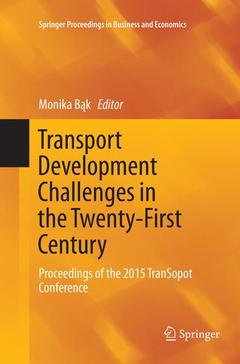Transport Development Challenges in the Twenty-First Century, 1st ed. 2016 Proceedings of the 2015 TranSopot Conference Springer Proceedings in Business and Economics Series

This volume explores the field of transport sector development. Derived from the 2015 TranSopot conference held in Sopot, Poland, it discusses current trends, issues, and research on the topic. Specifically, it aims to explore sustainable development, examines current problems ranging from transport systems to transport enterprises and provides a variety of analytical methods such as economic and econometric analysis.
The three most important fields of current transport research are sustainable transport development, innovation and technological progress and the conditions of transport enterprise growth and survival. Transport is an activity which is supposed to be sustainable, environmentally aware, economically optimal, socially sound and politically responsible. Striving for innovation in transport means looking for organizational and technical solutions which increase the efficiency, effectiveness and safety of transportation. However, the main research issue in the field are strategies for sustainable transport developments in urban and rural areas, instruments of internalization of external transport costs, promotion of environmentally-friendly transport behavior and improvement of transport energy efficiency. Transport infrastructure innovation, intelligent transport systems, innovations in management and finance are some of the main concerns of researchers and policy-makers in the field. Transport enterprises need to adapt to the conditions of the new economic growth perspectives. They need to create unique growth conditions, otherwise they will condemn themselves to struggle for survival. In particular, transport enterprises have to create special functioning systems and programs to diversify economic activity to use funds in the most efficient ways possible.Presents the most current trends and research in the field of transport sector development
Explores various transport issues facing transport systems, organizations and enterprises
Provides analytical methods such as econometric analysis
Includes supplementary material: sn.pub/extras
Date de parution : 04-2018
Ouvrage de 239 p.
15.5x23.5 cm
Date de parution : 03-2016
Ouvrage de 239 p.
15.5x23.5 cm
